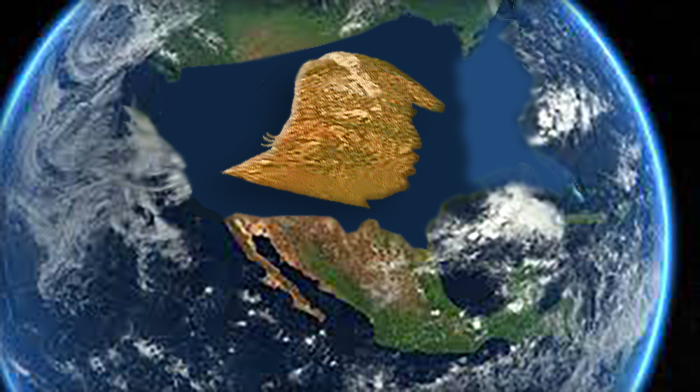
Nationalist, Globalist, Other
![]() By Frank F Islam & Ed Crego, November 13, 2018
By Frank F Islam & Ed Crego, November 13, 2018
You know what I am? I’m a nationalist, OK? I’m a nationalist.
Nationalist. Nothing — use that word. Use that word.
Thus proclaimed President Donald Trump at a rally for Senator Ted Cruz (R-TX) in Houston on October 22. Trump reaffirmed his proclamation in an interview with Fox News host Laura Ingraham on October 29 in which he explained:
I look at two things, globalists and nationalists. I’m somebody that wants to take care of our country, because for many, many years…our leaders have been worried more about the world than they have about the United States and they leave us in a mess…I’m proud of this country and I call that ‘nationalism’. I call it being a nationalist and I don’t see any other connotation than that.
The President might see it that way, but many others do not. His defining himself as a nationalist has evoked a firestorm of criticism — most of it centering around the fact that the choice of, and emphasis on, the word “nationalist” may possibly be a dog whistle to Trump’s base and supporters, signifying and reinforcing his commitment to a discriminatory and exclusionary United States of America.
Knowledgeable observers such as CNN Editor-at-large Chris Cillizza, New York Times columnist Peter Baker, and historian Michael Beschloss have commented as follows on the President’s “use” of that word:
- Cillizza points out, “Then there is the historical context of the word “nationalism.” It primarily conjures two close associations: Nazism and White nationalism.”
- Baker noted, “Typically, the term “nationalist” is employed by the United States government to describe political figures and forces in other countries that sometimes represents a threat. When used domestically, it is a word often tainted with the whiff of extremism…American politicians traditionally stick with the safer term ‘patriot.’”
- Beschloss, in a CNN interview after a white nationalist killed eleven Jews in a Pittsburgh synagogue states, “He went ahead with his campaign rally, he pronounced himself a “nationalist.” And the best explanation is that he didn’t know what he was saying on that sacred day.”
Did he or didn’t he know what he was saying on that “sacred day” or at any of the times that he has proudly and defiantly called himself a nationalist? That is neither an existential or a rhetorical question. It is the essential and relevant one here.
In this instance — unlike, oh so many others — the President may be telling the truth when he states why he selected the nationalist label for himself. It is widely recognized that Trump is historically, factually, and relationally challenged.
Put another way, he doesn’t know what he doesn’t know. And, what he doesn’t know is quite a lot. Given these inherent limitations, his defense may be ignorance.
It is not a good defense for someone who holds the highest office in the land, and should know better or confer with others who do before speaking out. Still, this could be just an extreme example of Trump opening his mouth and inserting his foot, as he has unwittingly done so many times during his tenure as President.
This interpretation might be accurate because the concepts of nationalism and nationalist are complex ones that vary contextually and definitionally. Cilliza, Baker, Beschloss, and numerous others have shone bright lights on the negative aspects and actions of nationalists.
The Oxford Dictionaries defines a nationalist as “a person who strongly identifies with their own nation and vigorously supports its interests, especially to the exclusion or detriment of the interests of other nations.” The Merriam-Webster Dictionary defines a nationalist as “an advocate of or believer in nationalism.”
The Merriam-Webster definition of nationalism is “loyalty and devotion to a nation especially: a sense of national consciousness exalting one nation above all others and placing promotion of its culture and interests as opposed to those of other nations or supranational groups.”
Trump’s nationalist and nationalism claims and self-assessment fall well within the bounds of both of those definitions. In these narrow frames, they don’t seem quite as radical or provocative as they do when viewed more expansively.
Historian Michael Lind provides another interesting, less threatening perspective on nationalists and nationalism. He writes,
But while there is an overlap between nationalists and racists, the two are not the same thing. The most extreme white nationalists don’t advocate nationalism as a governing philosophy in our multiracial country, they hope to withdraw from American life and create a white homeland within the nation-state. Nationalism is different than white nationalism, and a populist American nationalism untainted by vestiges of racial bigotry might have transracial appeal, like versions of national populism in Latin America.
Lind provides a useful distinction between what he calls “populist nationalism” and White nationalism. It cannot be said for certain which category Trump falls into.
In fact, given Trump’s double-talk, and flip-flopping many issues, it is impossible to determine whether he is a nationalist or a globalist. Don’t take our words for that. Take his.
As Pete Baker reports, in 2017, Trump told the Wall Street Journal. “I’m a nationalist and a globalist. I’m both.”
We would disagree. We would say that he is neither.
That he is something else. That something else is a “Trumpist.”
For the Trumpist, the self — the one and only — always comes first, and all other interests are secondary. The nation and the globe matter only as places to conquer and to subjugate to one’s personal interests. There is no such thing as allegiance or loyalty.
The Trumpist is an isolationist, opportunist, exploiter, self-promoter and prestidigitator. The Trumpist is himself an “enemy of the people”
We will have more to say on this “enemy of the people” in our next blog. Until then, we leave you with these thoughts on Donald Trump:
Enemy of the people. Use those words. Use those words.


